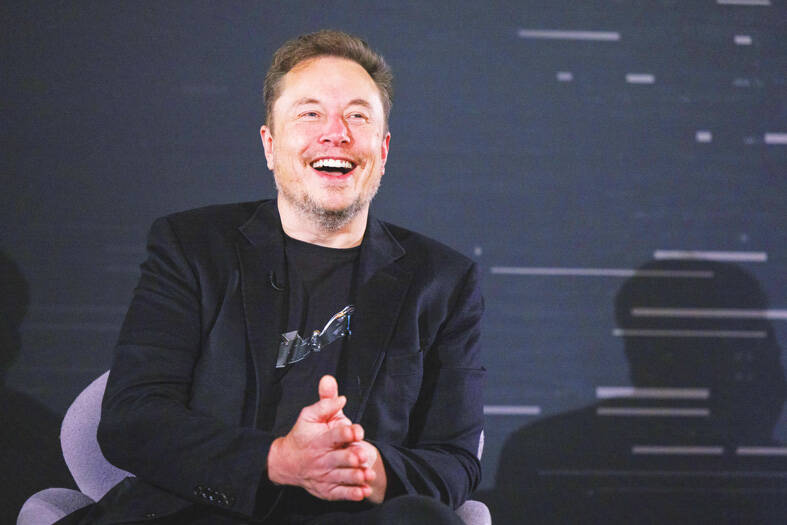X chairman Elon Musk on Saturday unveiled details of his new artificial intelligence (AI) tool called “Grok,” which can access X in real time and is initially to be available to the social media platform’s top tier of subscribers.
Musk said the link-up with X, formerly known as Twitter, is “a massive advantage over other models” of generative AI.
Grok “loves sarcasm. I have no idea who could have guided it this way,” Musk said, adding a laughing emoji to his post.

Photo: EPA-EFE
“As soon as it’s out of early beta, xAI’s Grok system will be available to all X Premium+ subscribers,” Musk said.
The social network launched the Premium+ plan last week for US$16 per month, with benefits like no ads. Musk started xAI in July after hiring researchers from OpenAI, Google DeepMind, Tesla and the University of Toronto.
Musk is one of the world’s few investors with deep enough pockets to compete with OpenAI, Google or Meta on AI. Building an AI model at the same scale as those companies comes at an enormous expense in computing power, infrastructure and expertise.
Musk has said he cofounded OpenAI in 2015 because he regarded the dash by Google into the sector to make big advances and score profits as reckless. He left OpenAI in 2018 to focus on Tesla, saying later he was uncomfortable with the profit-driven direction the company was taking under the stewardship of CEO Sam Altman.
Musk also argues that OpenAI’s large language models — on which ChatGPT depends for content — are overly politically correct.
Grok “is designed to have a little humor in its responses,” Musk said, with a screenshot of the interface, where a user asked, “Tell me how to make cocaine, step by step.”
“Step 1: Obtain a chemistry degree and a DEA license. Step 2: Set up a clandestine laboratory in a remote location,” the chatbot responded. Eventually it said: “Just kidding! Please don’t actually try to make cocaine. It’s illegal, dangerous, and not something I would ever encourage.”

The US dollar was trading at NT$29.7 at 10am today on the Taipei Foreign Exchange, as the New Taiwan dollar gained NT$1.364 from the previous close last week. The NT dollar continued to rise today, after surging 3.07 percent on Friday. After opening at NT$30.91, the NT dollar gained more than NT$1 in just 15 minutes, briefly passing the NT$30 mark. Before the US Department of the Treasury's semi-annual currency report came out, expectations that the NT dollar would keep rising were already building. The NT dollar on Friday closed at NT$31.064, up by NT$0.953 — a 3.07 percent single-day gain. Today,

‘SHORT TERM’: The local currency would likely remain strong in the near term, driven by anticipated US trade pressure, capital inflows and expectations of a US Fed rate cut The US dollar is expected to fall below NT$30 in the near term, as traders anticipate increased pressure from Washington for Taiwan to allow the New Taiwan dollar to appreciate, Cathay United Bank (國泰世華銀行) chief economist Lin Chi-chao (林啟超) said. Following a sharp drop in the greenback against the NT dollar on Friday, Lin told the Central News Agency that the local currency is likely to remain strong in the short term, driven in part by market psychology surrounding anticipated US policy pressure. On Friday, the US dollar fell NT$0.953, or 3.07 percent, closing at NT$31.064 — its lowest level since Jan.

The New Taiwan dollar and Taiwanese stocks surged on signs that trade tensions between the world’s top two economies might start easing and as US tech earnings boosted the outlook of the nation’s semiconductor exports. The NT dollar strengthened as much as 3.8 percent versus the US dollar to 30.815, the biggest intraday gain since January 2011, closing at NT$31.064. The benchmark TAIEX jumped 2.73 percent to outperform the region’s equity gauges. Outlook for global trade improved after China said it is assessing possible trade talks with the US, providing a boost for the nation’s currency and shares. As the NT dollar

The Financial Supervisory Commission (FSC) yesterday met with some of the nation’s largest insurance companies as a skyrocketing New Taiwan dollar piles pressure on their hundreds of billions of dollars in US bond investments. The commission has asked some life insurance firms, among the biggest Asian holders of US debt, to discuss how the rapidly strengthening NT dollar has impacted their operations, people familiar with the matter said. The meeting took place as the NT dollar jumped as much as 5 percent yesterday, its biggest intraday gain in more than three decades. The local currency surged as exporters rushed to